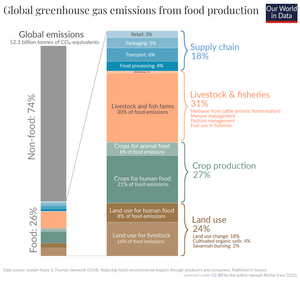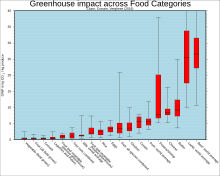Low-carbon diet
Asian countries like India and China feature vegetarian and vegan meals as staples in their diets.
[5] More fossil fuels are required for the production of animal-based foods like meat and dairy and have a higher carbon footprint.
[6] Large amounts of land are required to raise livestock for beef and dairy products and methane emissions from cattle contribute to the greenhouse gases in the atmosphere.
In China, there are five main influences that contribute to Buddhists keeping vegetarian diets:[12] In the U.S., the food system emits four of the greenhouse gases associated with climate change: carbon dioxide (CO2), methane, nitrous oxide and chlorofluorocarbons.
[13] The burning of fossil fuels (such as oil and gasoline) to power vehicles that transport food for long distances by air, ship, truck and rail releases carbon dioxide, the primary gas responsible for global warming.
[14] Anthropogenic methane emission sources include agriculture (ruminants, manure management, wetland rice production), various other industries and landfills.
The 100-year global warming potentials of methane and nitrous oxide are recently estimated at 25 and 298 carbon dioxide equivalents, respectively.
[16] Steinfeld et al. estimate that livestock production accounts for 18 percent of anthropogenic GHG emissions expressed as carbon dioxide equivalents.
[17] Of this amount, 34 percent is carbon dioxide emission from deforestation, principally in Central and South America, that they assigned to livestock production.
[19] Of emissions they attribute to livestock production, Steinfeld et al. estimate that globally, methane accounts for 30.2 percent.
[24] Livestock sources (including enteric fermentation and manure) account for about 3.1 percent of US anthropogenic GHG emissions expressed as carbon dioxide equivalents.
Such taxes would need to be designed with care: exempting and subsidising some food groups, selectively compensating for income loss, and using part of the revenue for health promotion.
An optimum plan would reduce emissions by 1 billion tonnes per year – similar in amount to those from aviation globally.
[28] For example, Ritchie explains that "producing 100 grams of protein from peas emits just 0.4 kilograms of carbon dioxide equivalents (CO2eq).
"[6] In June 2010, a report from United Nations Environment Programme declared that a global shift towards a vegan diet was needed to save the world from hunger, fuel shortages and climate change.
Cundiff and Harris write: "The American Dietetic Association (ADA) and Dietitians of Canada position paper officially recognizes that well-planned vegan and other vegetarian diets are appropriate for infancy and childhood.
Because CAFO production is highly centralized, the transport of animals to slaughter and then to distant retail outlets is a further source of greenhouse gas emissions.
[46] When looking at total greenhouse gases (not just carbon dioxide), 83% of emissions come from the actual production of the food because of the methane released by livestock and the nitrous oxide due to fertilizer.
[45] The word locavore describes a person attempting to eat a diet consisting of foods harvested from within a 100-mile radius.
This study researched which types of biodegradable packaging are the most heat-resistant as well, as plastic has tested superior in this aspect in the past.
Polyhydroxyalkanoates and polylactic acid (PLA) are examples of sustainable food packaging materials that are considered better than plastic, but could actually be harmful because they may contain chemical additives.








